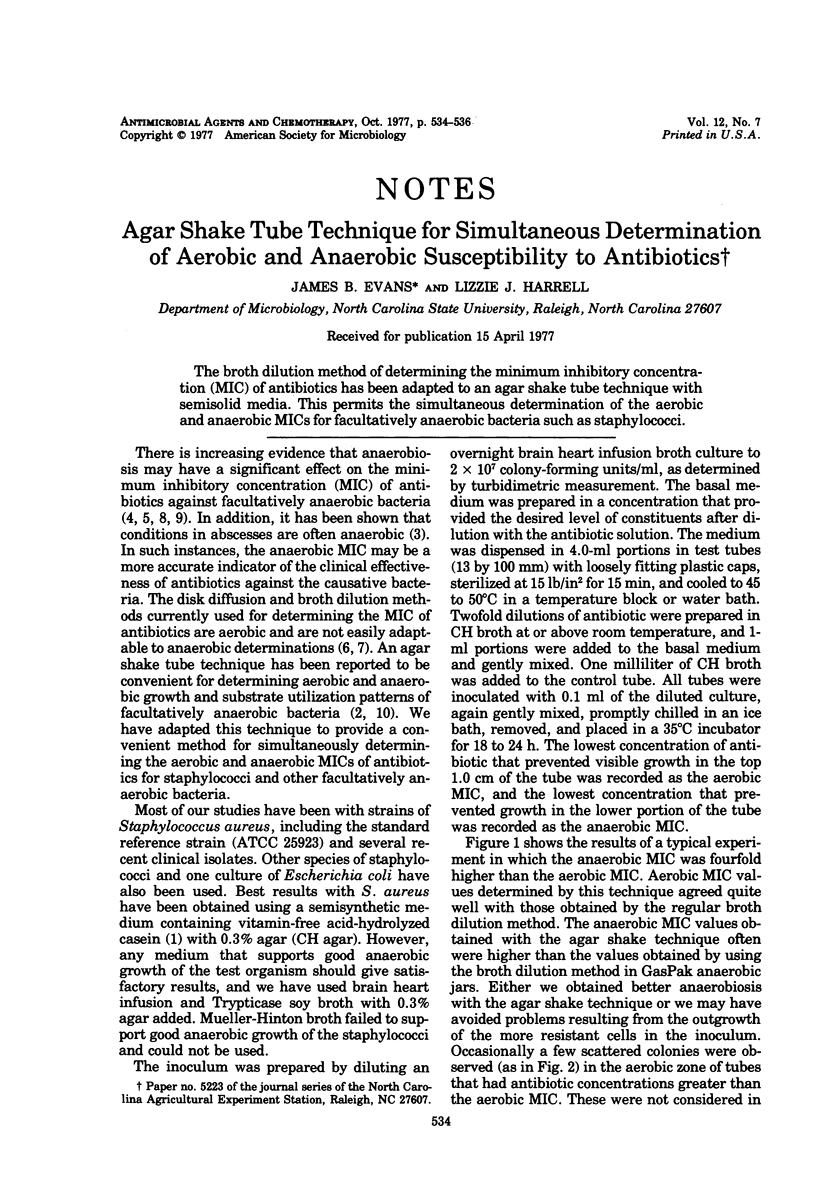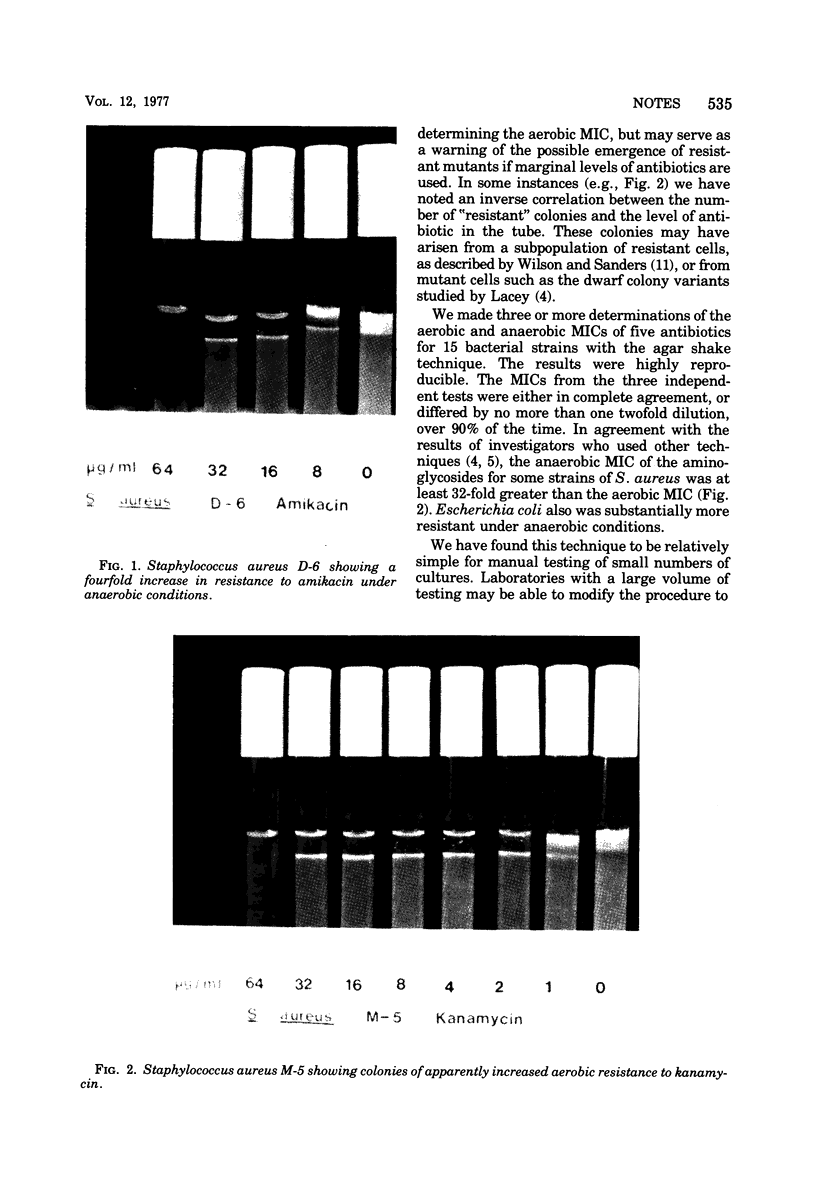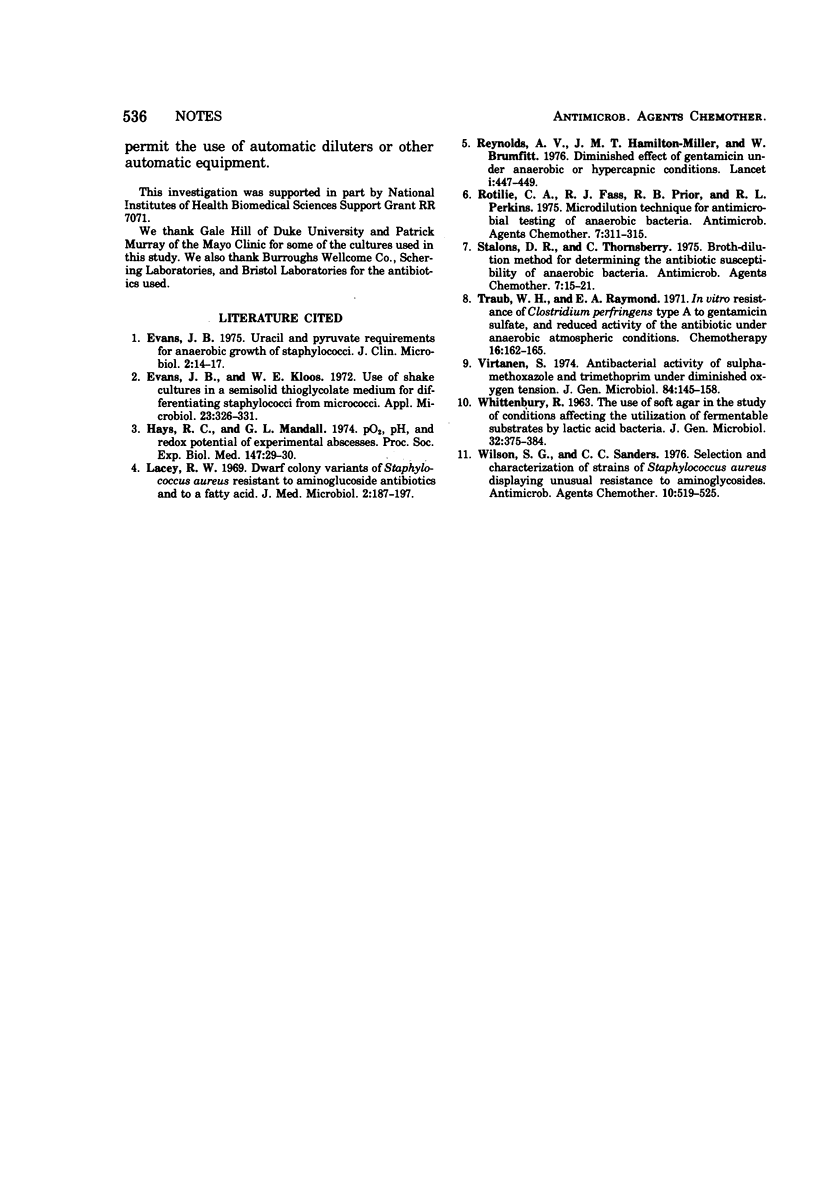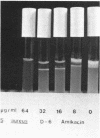Abstract
The broth dilution method of determining the minimum inhibitory concentration (MIC) of antibiotics has been adapted to an agar shake tube technique with semisolid media. This permits the simultaneous determination of the aerobic and anaerobic MICs for facultatively anaerobic bacteria such as staphylococci.
Full text
PDF


Images in this article
Selected References
These references are in PubMed. This may not be the complete list of references from this article.
- Evans J. B., Kloos W. E. Use of shake cultures in a semisolid thioglycolate medium for differentiating staphylococci from micrococci. Appl Microbiol. 1972 Feb;23(2):326–331. doi: 10.1128/am.23.2.326-331.1972. [DOI] [PMC free article] [PubMed] [Google Scholar]
- Evans J. B. Uracil and pyruvate requirements of anaerobic growth of staphylococci. J Clin Microbiol. 1975 Jul;2(1):14–17. doi: 10.1128/jcm.2.1.14-17.1975. [DOI] [PMC free article] [PubMed] [Google Scholar]
- Hays R. C., Mandell G. L. PO2, pH, and redox potential of experimental abscesses. Proc Soc Exp Biol Med. 1974 Oct;147(1):29–30. doi: 10.3181/00379727-147-38275. [DOI] [PubMed] [Google Scholar]
- Lacey R. W. Dwarf-colony variants of Staphylococcus aureus resistant to aminoglucoside antibiotics and to a fatty acid. J Med Microbiol. 1969 Aug;2(3):187–197. doi: 10.1099/00222615-2-3-187. [DOI] [PubMed] [Google Scholar]
- Reynolds A. V., Hamilton-Miller J. M., Brumfitt W. Diminished effect of gentamicin under anaerobic or hypercapnic conditions. Lancet. 1976 Feb 28;1(7957):447–449. doi: 10.1016/s0140-6736(76)91474-4. [DOI] [PubMed] [Google Scholar]
- Rotilie C. A., Fass R. J., Prior R. B., Perkins R. L. Microdilution technique for antimicrobial susceptibility testing of anaerobic bacteria. Antimicrob Agents Chemother. 1975 Mar;7(3):311–315. doi: 10.1128/aac.7.3.311. [DOI] [PMC free article] [PubMed] [Google Scholar]
- Stalons D. R., Thornsberry C. Broth-dilution method for determining the antibiotic susceptibility of anaerobic bacteria. Antimicrob Agents Chemother. 1975 Jan;7(1):15–21. doi: 10.1128/aac.7.1.15. [DOI] [PMC free article] [PubMed] [Google Scholar]
- Traub W. H., Raymond E. A. In vitro resistance of Clostridium perfringens type A to gentamicin sulfate, and reduced activity of the antibiotic under anaerobic atmospheric conditions. Chemotherapy. 1971;16(3):162–165. doi: 10.1159/000220723. [DOI] [PubMed] [Google Scholar]
- Virtanen S. Antibacterial activity of sulphamethoxazole and trimethoprim under diminished oxygen tension. J Gen Microbiol. 1974 Sep;84(1):145–148. doi: 10.1099/00221287-84-1-145. [DOI] [PubMed] [Google Scholar]
- WHITTENBURY R. THE USE OF SOFT AGAR IN THE STUDY OF CONDITIONS AFFECTING THE UTILIZATION OF FERMENTABLE SUBSTRATES BY LACTIC ACID BACTERIA. J Gen Microbiol. 1963 Sep;32:375–384. doi: 10.1099/00221287-32-3-375. [DOI] [PubMed] [Google Scholar]
- Wilson S. G., Sanders C. C. Selection and characterization of strains of Staphylococcus aureus displaying unusual resistance to aminoglycosides. Antimicrob Agents Chemother. 1976 Sep;10(3):519–525. doi: 10.1128/aac.10.3.519. [DOI] [PMC free article] [PubMed] [Google Scholar]




